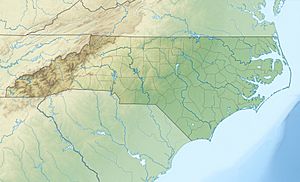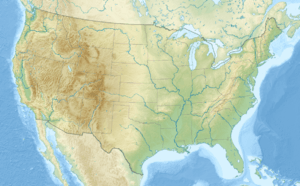Toms Creek (Ararat River tributary) facts for kids
Quick facts for kids Toms Creek |
|
|---|---|
|
Location of Toms Creek mouth
|
|
| Other name(s) | Tributary to Ararat River |
| Country | United States |
| State | North Carolina |
| County | Surry |
| Physical characteristics | |
| Main source | Big Creek divide about 0.25 miles west of Woodville, North Carolina 1,390 ft (420 m) 36°30′06″N 080°29′09″W / 36.50167°N 80.48583°W |
| River mouth | Ararat River about 5 miles northeast of Pine Hill, North Carolina 878 ft (268 m) 36°22′27″N 080°32′21″W / 36.37417°N 80.53917°W |
| Length | 16.10 mi (25.91 km) |
| Basin features | |
| Progression | south and southwest |
| River system | Yadkin River |
| Basin size | 38.44 square miles (99.6 km2) |
| Tributaries |
|
| Waterbodies | Loves Lake |
| Bridges | Cain Road, Alei Lane, Toms Creek Church Road, Galloway Ridge Trail, Cleo Cain Road, Jessup Grove Church Road, Matthews Road, US 52, W Dodson Mill Road, Cliffside Trail, Toms Creek Road |
Toms Creek is a stream located in Surry County, North Carolina, in the United States. It flows for about 16.10 miles (25.91 kilometers) and is an important part of the local river system. This creek eventually flows into the Ararat River.
Where Toms Creek Begins and Ends
Toms Creek starts its journey near Woodville, North Carolina. It begins on a high area known as the Big Creek divide. From there, the creek flows generally south.
As it continues, Toms Creek turns towards the southwest. Its path leads it to join the Ararat River. This meeting point is about 5 miles northeast of Pine Hill.
The Toms Creek Watershed
A watershed is an area of land where all the water drains into a common point, like a river or a lake. The Toms Creek watershed covers about 38.44 square miles (99.56 square kilometers). This means all the rain and water that falls in this large area eventually flows into Toms Creek.
The area around Toms Creek receives a good amount of rain, about 48.1 inches (122 centimeters) each year. A large part of this watershed, about 58%, is covered by forests. These forests help keep the water clean and provide homes for many plants and animals.
 | Shirley Ann Jackson |
 | Garett Morgan |
 | J. Ernest Wilkins Jr. |
 | Elijah McCoy |



